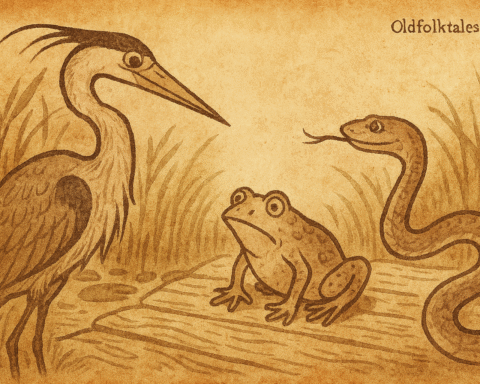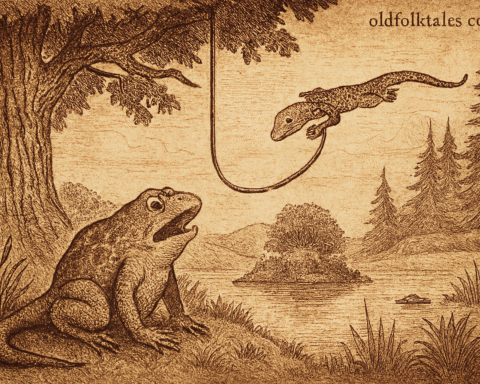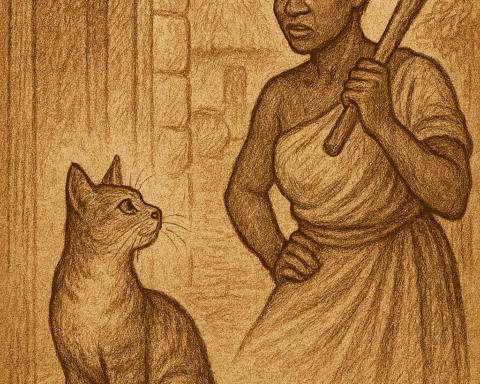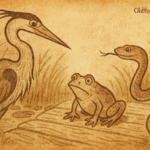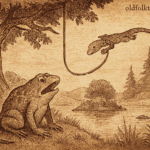Many, many years ago, when the world was younger and the bonds between creatures had not yet hardened into the patterns we know today, there came a season of terrible hardship that would be remembered for generations. The rains that year fell like the tears of angry ancestors, ravaging the landscape with merciless fury. Floodwaters swept across the fertile fields, rotting crops in the ground before they could be harvested, turning hope into despair with each passing day.
Famine stalked the land like a hungry predator, claiming lives with ruthless efficiency. Illness followed close behind, and entire families were wiped from existence as easily as footprints in sand. The survivors wandered like lost spirits, their eyes hollow with grief and their bodies weakened by hunger.
Among the fortunate few who weathered this catastrophic season were two unlikely companions: Bushi-the-Cat and Mbia-the-Rat. In those desperate times, when survival meant everything and old prejudices meant nothing, these two creatures found in each other not just companionship, but salvation itself.
Also read: Why Tortoise Has a Cracked Shell
Their friendship bloomed like a rare flower in drought-stricken soil. They pooled their meager resources with the desperation of those who understood that cooperation meant life while isolation meant death. Together, they shared a single dwelling, its walls echoing with their combined laughter and conversations. They ate from the same cooking pot, the warmth of shared meals binding them closer than blood. Side by side, they worked their combined fields, their different strengths complementing each other under the scorching sun.
On one particular morning, when the market buzzed with the hopeful energy of another day survived, Cat and Rat ventured forth together to purchase supplies. Their careful savings, hoarded grain by grain through months of hardship, allowed them to buy some precious mbwe tseb, mudfish whose rich flesh promised a feast worthy of celebration.
Back in their humble kitchen, the aroma of their cooking filled every corner of their home like incense in a shrine. They prepared the mudfish with the reverence of those who knew true hunger, seasoning it with herbs that transformed their simple meal into something magnificent. When they finally sat down to eat, the flavors danced on their tongues like music, and they consumed exactly half their treasure, carefully preserving the remainder for the following day.
That night, they slept the peaceful sleep of those whose bellies were full and whose hearts were content, their dreams sweet with the promise of another delicious meal awaiting them.
The next morning dawned bright and clear, filling them with energy for the day’s work ahead. Cat collected his sharp cutlass, its blade gleaming in the early light, while Rat shouldered his sturdy hoe, its wooden handle worn smooth by countless days of honest labor. Together, they set out for their farm, which lay four hills and three valleys away from their village, a journey that usually passed quickly in companionable conversation.
But on this morning, something had changed in Rat’s demeanor. His usual cheerful chatter had dried up like a stream in drought season. His eyes held a distant, distracted look that troubled Cat’s generous heart. Where normally their path would echo with shared jokes and plans for the day’s work, now only the sound of their footsteps broke the unusual silence.
Cat glanced repeatedly at his friend, wondering what thoughts occupied Rat’s mind so completely. Unknown to Cat, Rat’s entire being had become consumed with memories of the previous night’s meal. The taste of that succulent mbwe tseb haunted his every step, and with each passing moment, his desire to return home and claim the remaining portion grew stronger than his loyalty to their shared labor.
They had barely traversed one valley and conquered a single hill when Rat’s internal struggle reached its breaking point. With theatrical suddenness, he threw his hoe to the ground, stumbled dramatically over its wooden handle, and collapsed onto the red earth, clutching his stomach as if seized by invisible demons.
“Oh, my dear friend,” he cried out, his voice trembling with fabricated pain, “something terrible is wrong with me! I see many skies spinning above me, and everything whirls around like leaves in a whirlwind!”
Cat’s concern was immediate and genuine. “We probably descended that last hill too quickly,” he suggested, his voice filled with worry. “Rest here a moment. If you feel better, we can walk slowly across this plain.”
“I don’t think it’s the hill,” Rat moaned convincingly, adding just enough weakness to his voice to sound truly distressed.
With the tenderness of a true friend, Cat sat down and gently placed Rat’s head in his lap, pressing his cool palm against Rat’s supposedly fevered brow. The deception felt so real that even Cat began to worry seriously about his companion’s health.
“You’re genuinely unwell,” Cat concluded, trying to help Rat to his feet. “Come, let me carry you home on my back. You shouldn’t be walking in this condition.”
But Rat, whose plan required him to return home alone and unobserved, protested with feigned bravery. “No, my good friend, why should you go to such trouble? Don’t worry about me, I’ll walk slowly and reach home safely.”
“Well,” Cat replied reluctantly, his generous nature warring with his concern, “if you’re certain you can manage alone, then go. But I must at least inspect our farm before returning to check on your condition.”
Rat began his journey home with the slow, labored steps of one truly suffering, dragging his feet as if each step caused him agony. But the moment Cat’s concerned figure disappeared beyond the hill’s crest, Rat’s entire demeanor transformed. Like a bird released from captivity, he flew homeward with the speed of a swallow, his feet barely touching the ground as he raced toward his prize.
Upon reaching their dwelling, Rat made straight for the kitchen where their precious pot of mbwe tseb waited. His hands shook with anticipation as he knocked the lid aside with impatient force. Then, abandoning all restraint, he leaped directly into the pot itself, surrounding himself with the very object of his desire.
He ate with the desperate intensity of one who had been starving for years rather than hours. Each morsel disappeared as quickly as raindrops in desert sand, and still his appetite raged unquenched. When only a single, lonely piece of fish remained at the pot’s bottom, Rat paused for a moment, his conscience attempting one final, feeble protest. Perhaps he should save this last morsel for his trusting friend?
But temptation proved stronger than friendship. His throat constricted with longing, his heart hammered with selfish desire, and closing his eyes to shut out any remaining guilt, he devoured the final piece.
Now Rat’s stomach bulged grotesquely, swollen like the belly of a child suffering from kwashiorkor. When he attempted to leap from the pot, he discovered that his gluttony had created an unexpected prison. His bloated form made each jump more difficult than the last, and despite many frantic attempts, he could not achieve the height necessary to escape.
Growing desperate, Rat took the deepest breath his distended stomach would allow and made one final, mighty effort. But instead of clearing the pot’s rim, he landed precariously on its narrow mouth. The earthenware vessel, unbalanced by his weight, flipped completely upside down, trapping him beneath like a prisoner under an enormous clay dome.
There he remained throughout the long afternoon, a victim of his own greed, while the sun traced its path across the sky and evening shadows began to gather.
When Cat finally returned from their farm, his body weary from a full day’s honest labor, he expected to find Rat resting comfortably in their shared bed. Instead, the house felt strangely empty, filled only with the echo of his own footsteps.
“Perhaps he’s gone to ease himself,” Cat reasoned, settling down to wait for his friend’s return. But as minutes stretched into an hour with no sign of Rat, worry began gnawing at Cat’s generous heart.
He searched their small compound thoroughly, checking every corner where a sick friend might have sought comfort. When this proved fruitless, he expanded his search to include every room of their dwelling, calling Rat’s name with increasing concern.
It was in the kitchen that Cat made his puzzling discovery. Their precious pot of mbwe tseb sat in an impossible position, its round bottom pointing toward the ceiling while its mouth pressed firmly against the earth floor.
“What could have happened here?” he wondered aloud, his voice echoing strangely in the quiet kitchen.
Bending down with careful curiosity, Cat stretched out both hands and lifted the pot’s mouth from the floor. The moment his hands raised the earthenware prison, something shot past him with the speed of lightning, heading directly for the nearest hole in the wall.
“Ooh! Dead-Body-of-Mine!” Cat cried out in startled shock, his surprise so complete that the pot slipped from his grasp and shattered into countless pieces against the hard floor.
Spinning around just in time, Cat caught a glimpse of the fleeing figure, a bloated, guilty Rat disappearing into the darkness of his bolt-hole.
Understanding crashed over Cat like a falling tree. The supposed illness, the dramatic collapse, the urgent need to return home alone, every piece of the elaborate deception became crystal clear in that devastating moment.
“Ah, so that’s why you claimed to be ill!” Cat bellowed, his voice shaking with betrayal and rage. “Liar! It’s true that the anus of a fowl is seen only when the wind blows, your true nature has finally been revealed! You thief! You scoundrel! You are no friend of mine!”
His fury burned hotter than forge fires as he continued his condemnation: “When I catch you and I will catch you, I’ll eat you for your treachery!”
Cat was indeed bitter-in-the-throat, his heart poisoned by the knowledge that his trust had been so callously betrayed.
And so the Beba people say that from that terrible day forward, cats began to hunt rats with relentless determination. No longer would they share meals or warm sleeping places. Instead, cats would pursue rats anywhere and everywhere, until their very last breath, carrying out an eternal vendetta born from friendship betrayed and trust forever broken.
Moral Lesson
This folktale teaches us that greed can destroy even the strongest friendships and create enemies where once there was love. Rat’s inability to control his selfish desires not only cost him a precious friendship but also condemned his entire species to eternal persecution. It reminds us that our actions in moments of temptation can have consequences that extend far beyond our own lives, affecting generations to come.
Knowledge Check
Q1: What role does the famine setting play in this African folktale’s moral impact? A: The famine setting emphasizes how precious and rare food was, making Rat’s betrayal even more heinous. During times of scarcity, sharing food represents the ultimate act of friendship and trust, so Rat’s theft becomes not just greed but a violation of survival solidarity.
Q2: How does Rat’s deception technique reflect traditional African storytelling about tricksters? A: Rat’s elaborate fake illness shows the classic trickster trait of using wit and performance to achieve selfish goals. However, unlike positive trickster tales where cleverness overcomes oppression, this story shows how deception used against friends leads to permanent consequences.
Q3: What cultural significance does the shared pot and home have in this Beba folktale? A: In African culture, sharing a home and eating from the same pot represents the deepest form of friendship and family bond. These symbols make Rat’s betrayal equivalent to violating sacred hospitality laws and breaking the most fundamental social contracts.
Q4: Why does the story end with eternal hunting rather than simple punishment? A: The eternal nature of cats hunting rats transforms personal betrayal into a universal law, showing how individual actions can create lasting consequences for entire species. This reflects the African belief that moral violations have effects that extend beyond personal relationships.
Q5: How does Cat’s generous character contrast with Rat’s greed in the story’s moral framework? A: Cat represents ideal friendship—generous, trusting, and self-sacrificing, while Rat embodies destructive selfishness. This stark contrast emphasizes how good character can be exploited by those with evil intentions, but ultimately justice prevails through natural consequences.
Q6: What does the mbwe tseb (mudfish) symbolize beyond just food in this tale? A: The mudfish represents trust, shared sacrifice, and the fruits of cooperative labor. By consuming it all alone, Rat doesn’t just steal food—he destroys the symbol of their partnership and mutual survival, making his crime about breaking sacred bonds rather than mere gluttony.

